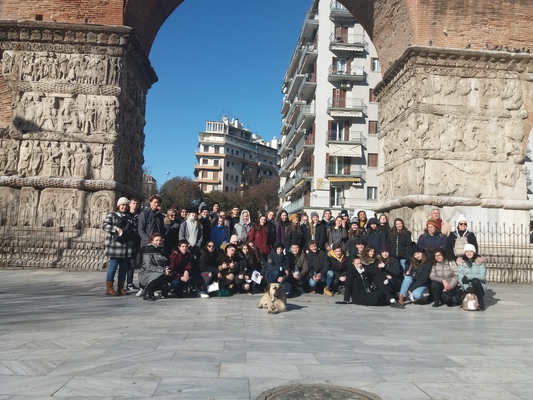The first Transnational Learning Activity focused on “Democracy and Environment in Institutions”. The Work Programme, prepared by the host school, can be seen here:
Mobility Program _GREECE.pdf
Prior to the five-day Mobility, the participants prepared the material to be presented and shared it with the rest of their partners during the Activity. This preparation, in each school, involved visits to local institutions for Sustainability and interviews with representatives of the local and European authorities. During the main activity the participants worked on how democracy and democratic values in relation to the protection of the Environment and Sustainability take effect in institutions on a local, national and European level. Within this context the participants used ICT presentation tools to present their school, their city and their country. In a plenary session, they also shared the pros and cons of their country in terms of “Democracy and Environment in Institutions”. After each presentation there was a discussion between students and teachers so that they would find similarities and differences, in addition to identifying the positive elements and weaknesses in the way institutions function in each country. The host school had prepared a poster-gallery of relevant national democratic personalities of all times and their political ideas as well as their contribution to the establishment of democratic principles and values in the host country, the cradle of democracy.
During field trips to local authorities, organizations, cultural associations and museums, the participants listened to informative talks, interviewed the people in charge and participated in workshops and interactive games, thus having a hands-on experience of the way democratic values and respect for Human Rights co-exist with the protection of Environment and Sustainability. The participants worked in groups of mixed nationalities, gathered and combined their experiences during the field trip activities and visits, recorded the results and created digital material that was presented by each group in the school library. The specific digital material, in the form of videos, Power Point presentations, Prezi presentations, digital notice boards (Padlet) depicted their ideas, their thoughts, their knowledge and their feelings from the first Transnational Learning Activity and was uploaded on the Project Blog. Along with the Democratic / Non-democratic European Wall on display at the host school, the documentation of the first Mobility activities was also uploaded on the Project Blog. A Teacher Conference to discuss the work process and the results of this first Transnational Learning Activity also took place, while both the participant students and the accompanying teachers were involved in an online Evaluation of the Learning Activity.
PARTICIPANTS
- twenty-one students from the host country Greece (Kostas Tsilis, Antonis Vasiliadis, Vicky Tzouvaras, Lia Kapalika, Melina Metaxa, Despina Tzima, Giorgos Lokmanidis, Katerina Della, Elena Theodorou, Sophia Panidou, Nikos Tsiflidis, Maria Tsouflidou, Leonidas Koukouravas, Panagiotis Piperidis, Katerina Patopoulou, Vicky Moisidou, Katerina Feizatidou, Anna Tzirou, Emilia Kirtsiou, Giannis Psarras and Olympia Papafetimiou) and six teachers (Chara Axouristou, Efi Liakopoulou, Elena Giannaki, Katerina Totska, Stamatis Chrisis and Tasos Moschopoulos)
- seven students from Portugal (Alexandra Leite, Carolina Vítor, Inês Capelas, Jéssica Carrasqueira, Maria Rodrigues, Marta Fernandes, Rafael Oliveira) and two accompanying teachers (Ana Maria Marques Dias, the Project Coordinator, and Maria Guilhermina Galego).
- seven students from Estonia (Andreas Idavain, Carmen Pajuste, Jaak Antonov, Johanna Marie Mäeväli, Kaspar Parve, Mariella Soom, Viktoria Borissov) and two accompanying teachers (Piia Palge-Lepik and Kai Peterson).
- seven students from Finland (Rebecka Asplund, Miina Jousmaki, Matilda Eriksson, Emil Zittra, Alva Sandelin, Daniel Berg, Hannes Hiekkanen) and two accompanying teachers (Jeanette Kecklund and Mikaela Hansen).
Throughout the activity the participants attended lessons at the host school, which gave the guest participants the opportunity to get in touch with the host students and teachers and experience their school life.
The field trips and visits were carefully selected so that they would serve the purpose and content of the project and would be related to the activities that the host school commonly organizes in order to introduce and present Greek history, culture and local traditions.
The guest students and teachers also attended a Greek language lesson, which contributed to the improvement of the participants’ intercultural communication and understanding. This knowledge along with the extensive use of the English language was invaluable for all participants during their visits and field trips.
The host school organized a lesson on human rights and the need to protect them, during which the participants, from all four countries, attended a video presentation and a lecture by the Social Studies host teacher and discussed the relevant topic.
The participant students worked in groups of mixed nationalities in the school classrooms, the Computer Lab and the School Library and, through this collaboration, they exchanged ideas and knowledge on how European Institutions function and foster Democracy and Sustainability.

A group photo at Thessaloniki
Further information, specially the Booklet about this Transnational Experience, can be found in our Home Page and in our Blog.